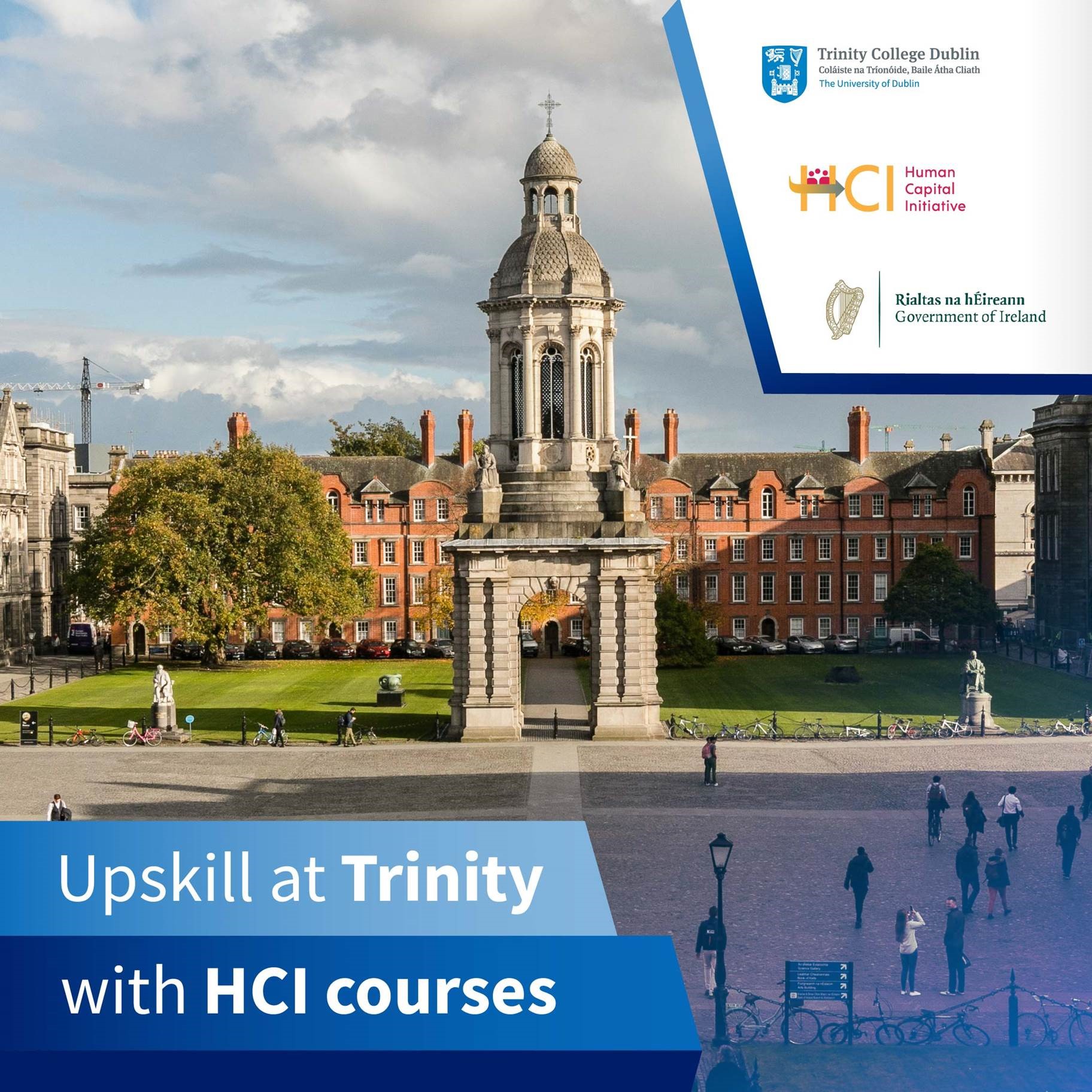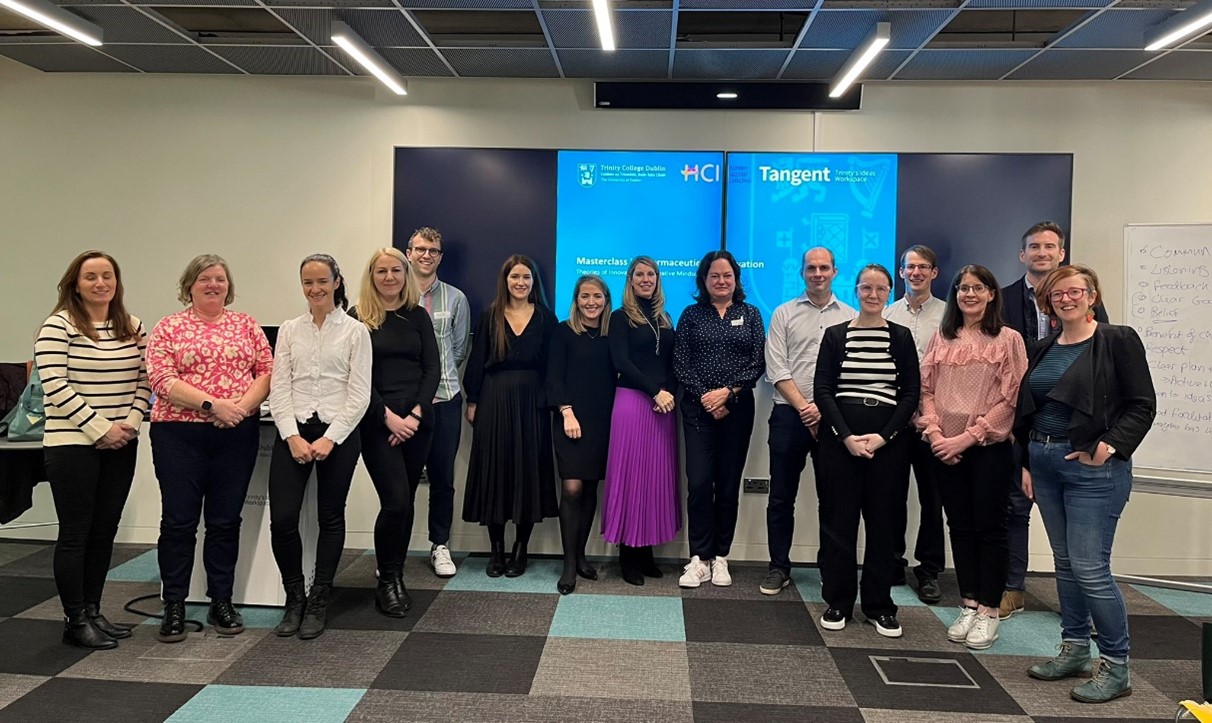
Project Name
Next generation teaching and learning for the changing needs of society and industry.
For more information, please visit our website.

Project Team
- Prof Orla Sheils, Vice-Provost and Chief Academic Officer (HCI Project Sponsor)
- Michael Slevin, Academic Services Division Manager (HCI Project Director)
- Arleen Folan, HCI Project Manager
- Sarah Tressel, HCI Project Administrator
Provide a short description of the project
In collaboration and partnership with enterprise, Trinity’s HCI project will deliver a transformative step change in innovation and agility in key areas of next generation teaching and learning. The project is designed to maximise benefits for industry and society by addressing crucial skills shortages and upskilling needs while driving system change within Trinity College and the higher education sector through comprehensive and targeted innovation initiatives in teaching delivery and opening the university to new learner groups.
The project aims to:
1) Transform teaching and provide flexible learning through online and blended options
2) Future-proof graduates with skills to adapt to a changing employment
3) Broaden and deepen our relationships with enterprise.
Trinity’s HCI project is developing a suite of new postgraduate taught modules and courses and a comprehensive suite of professional short courses for diverse learner cohorts. These modules and courses will enable students to develop priority skills that will empower them to adapt to future work environments and service society and the economy.

Pictured: Masterclass in Pharmaceutical Innovation: Creative Collaboration in Pharmacy – CPD participants, October 2022
The courses are providing optimum flexibility for those already employed in industry and other lifelong learners with modular and flexible offerings including CPDs and Micro-credentials. There is a move towards a challenge-based approach to teaching rather than a narrowly discipline-focused one. Teaching will be centred around global challenges as well as the challenges facing industry and the need for graduates with interdisciplinary knowledge and transversal skills. There is a mix of work-based assignments, project-based and real-world learning to give students valuable work-based experience and a chance to apply their academic knowledge to develop transversal skills sought by employers.
The project comprises 24 unique work packages which are organised into 5 themes (Micro-credentials pilot; Environment and Sustainability; Well-being and the Care Economy; ICT, Data Science & Engineering; and People Culture & Leadership). One of the 24 work packages is completely devoted to enterprise engagement and aims to encourage innovative and creative approaches to curriculum design and delivery. The Enterprise Eco-system is committed to building networks across enterprise and academia through consolidating existing HCI partner enterprises and providing creative spaces for problem solving, inventing, and collaborative future learning design opportunities.
This project aims to have a lasting and transformative impact for Trinity and the Irish HEI sector by promoting and fostering a culture of innovation and agility across the whole institution.
Highlight interesting collaborations / partnerships
Module with contributions from 3 Academy Award winners: In the Motion Picture Engineering module, students are introduced to two topics: Cinema post-production and video streaming. The module has a distinctive industrial research element some of the best industry researchers in the area were invited as speakers: Peyman Milanfar (Google Research), Marta Mrak (formerly BBC), Peter Hillman (Weta Digital R&D), Ioannis Katsavounidis (Meta Video Infrastructure). This module is possibly the only module in Europe to have contributions from 3 Academy Award winners: Simon Robinson, Peter Hillman and Anil Kokaram.
Open Incubator platform:
The Open Incubator is an open innovation program growing third level student entrepreneurship across Ireland. The program seeks to cultivate a culture of innovation, creativity, and collaboration amongst Ireland’s student innovators and empower them to pursue an entrepreneurial path by demystifying Ireland’s complex and complicated innovation ecosystem. Tangent Trinity’s Ideas Workspace has engaged with UCC, UL, DCU, University of Galway and SETU to examine how to open up the Open Incubator platform to their students to foster cross university student collaboration in a number of areas. The Open Incubator platform is aimed at scaling supports for TCD students by providing a set of digital guides to allow students to develop their business ideas at their own pace.
Student exchange: Staff and student exchanges took place from January 2022 and included the following:
- Presentation on Tangent HCI-funded hybrid delivery to the annual AdvanceHE Teaching and Learning Conference 2022 (650+ delegates)
- Collaborative exchange with Imperial College London/Imperial Enterprise Lab and Kings College London-Entrepreneurship Institute
- Collaborative exchange with Science Gallery Rotterdam
- Collaborative exchange with Nebreja University and Comillas University
- Attendance at Creative Education Foundation Annual Conference September 2022.
- Partnership with the Creative Education Foundation (CEF) which led to the development of the Tangent Creative Problem-Solving (CPS) challenge-based workshop offering.
- Student exchange (peer to peer pitching feedback session between Tangent students and students at University of Miami in Ohio) took place November 2022
- Student exchange (peer to peer pitching feedback session) is in progress for Semester 2 2023 with students from the UG Cert Innovation and Entrepreneurship and students of the University of North Dakota.
Community of Practice: The micro-credentials at Trinity team held a Community of Practice event in late 2021 that brought together over 80 participants, many from individual enterprises and industry representative groups including IBEC and ISME.
Immersive Technologies Skillnet
Micro-credentials at Trinity partnered with the Immersive Technologies Skillnet to recruit learners for three micro-credentials offered by the School of Engineering:
- Introduction to XR: Applications and Technologies
- Spatial Audio
- Motion Picture Engineering
The Skillnet subsidised 30% of the MC fees for eligible leaners and promoted the courses to their networks.
The QP Exchange held two events in the past year – This is an online networking and professional development event held bi-annually for current and recent graduates of the MSc in Pharmaceutical Manufacturing Technology. This event provides an opportunity for participants to network and discuss interesting topics relating to medicine quality, the role of a QP, and the current challenges facing QPs. It also encourages continuous professional development.
The Challenge Forum – Students (MSc in Pharmaceutical Manufacturing Technology) presented an outline of their proposed research projects online to the challenge forum. The challenge forum was comprised of a Business Academic, a Project Manager, a Pharmaceutical Academic, & a Qualified Person.
Regional Innovation Hub Tangent have partnered with a regional innovation hub in a collaborative delivery of our Process programme. This partnership has increased the reach of the Series to a regional network and community in the South-West of Ireland.
Skillnet Network Tangent have developed and delivered a bespoke programme for a nationwide Skillnet Network. Further programmes, informed by the future skills and training needs of the network, are planned for 2023.
Provide a brief summary of the project’s key enterprise engagements
- Engineers Ireland.
A number of CPDs and micro-credentials have been officially accredited with Engineers Ireland, such as:
- CPD in Sustainable Green Organisation
- CPD in Systemic Risk Management
- 5 new modules as part of Postgraduate Cert/Diploma/MSc Zero Carbon Technology
- Air Pollution: Monitoring Assessment Control
- Advanced Spatial Analysis GIS
- Cyber-physical Systems and Control
- Low Carbon Power Technology
- Microsoft
Microsoft are providing significant funding to support students working on cutting-edge quantum research at Trinity and have established a female scholarship programme for our MSc. in Quantum Science and Technology. The Microsoft-TCD Fellowship Scheme for best female applicants (4-year sponsorship) has been established.
- Dell
A massive scale-up in the computational resources required for classroom teaching involves Dell who will configure a suitable spec that can meet student needs in the Biological Data Analytics modules.
- Irish Centre for High End Computing (ICHEC)
Collaboration on a module on virtual laboratories in quantum and scientific programming for quantum mechanics. ICHEC are Ireland’s national computational facility.
- Alstom
The module ‘Computation for Transportation Engineering’ has been developed mainly focusing on the application of Data Science and AI in the Transportation domain. This module is delivered jointly with the industry leader Alstom.
- IBM
IBM are involved in assessing student presentations in Computational Data Centric Engineering.
- Health Product Regulatory Authority (HPRA)
Collaboration with the Health Product Regulatory Authority on the design and philosophy of the MSc in Regulatory Affairs for Medical Devises.
The Masters in Pharmaceutical Manufacturing Technology was directly involved in this year’s QP (Qualified Persons) Forum.
- Software Engineering Internships (20):
The School of Computer Science & Statistics engaged with 20 companies, offered over 40 different software engineering projects for 286 students and placed 64 students in internships.
- Mason Hayes Curran:
Collaboration with the School of Social Work and Social Policy to develop two micro-credentials in legal training for child protection, and domestic violence. Some of the teaching on the micro-credential is delivered by Mason Hayes Curran Partner Sonya Bruen.
- National Transport Authority (NTA):
In addition to co-creating the micro-credential, the NTA funded their employees as learners on an iteration of the micro-credential. Margaret Malone, Head of Corporate Services at the NTA, shares her experiences of working with Trinity College Dublin https://youtu.be/ZlDbCgqWfyo
Honourable mentions:
- Software Engineering Industry Advisory Board
- Software Engineering (SwEng) Projects Showcase and Industry Awards
- Qualified Person (QP) Forum
Project Showcase
Websites:
- Tangent: https://www.tcd.ie/tangent/programmes/shortcourses/design-thinking-for-strategic-innovation/
- MSc. In Quantum Science and Technology
- Languages for Employability
- Environmental Essentials for Engineering Projects CPD Programme
- Continuous Professional Development
- Micro-credentials
- Introduction to Computer Game Writing
Social media:
- X @tcdmicrocreds
- LinkedIn: @tcd-micro-credentials
- Instagram:@Trinitymicrocredentials
Media:
- Trinity College Dublin Professor of Quantum Physics Discusses Opportunities Available for Graduates in This Growing Sector in Ireland (thequantuminsider.com)
- ‘Engineering for Climate Action’ Lunchtime Lecture Webinar Series
- Podcast featuring Will Ratoff, lecturer of ‘Big Data, Artificial Intelligence & Ethics’: https://www.goloudnow.com/podcasts/una-and-andreas-united-ireland-855/episode-147-the-ethics-of-ai-347523
- Irish Times feature: https://www.irishtimes.com/advertising-feature/trinity-college-dublin/micro-credentials-lifelong-learning-for-a-new-era-1.4883693
- Blog post https://www.courses.ie/the-importance-of-lifelong-learning/
- Blog post https://www.courses.ie/why-take-a-micro-credential-at-trinity-college-dublin/
- Article https://www.engineersireland.ie/Engineers-Journal/More/Sponsored/why-engineers-are-choosing-micro-credentials-to-keep-pace-with-industry-developments
- Article https://www.engineersireland.ie/Engineers-Journal/More/Sponsored/transport-modelling-and-planning-skills-are-in-demand-in-ireland
- Computer Game: Face/Value (SureWhyNot?, 2023)
- Computer Game: Guitar Zeros (HoloMoon, 2023)
- Awake (Crybaby Studios, 2023): https://x.com/crybaby_studios/status/1630191242213572608?s=20
Last updated: November 2024